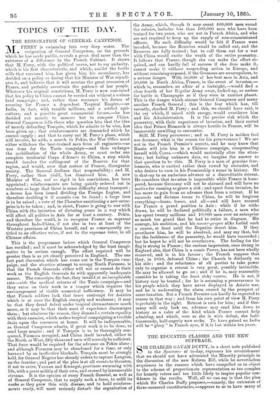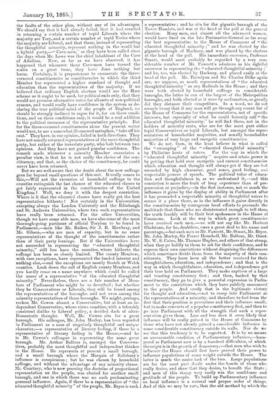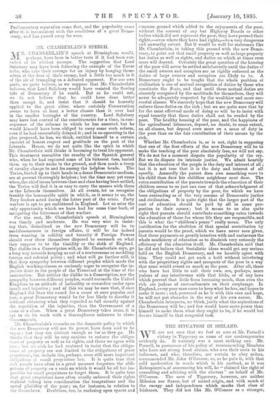THE EDUCATED CLASSES AND THE NEW SUFFRAGE.
SIR CHARLES GAVAN DUFFY, in a short note published in the Spectator of to-day, expresses his astonishment that we should not have advocated the Minority principle in the discussion of the new Reform Bill, while he nevertheless acquiesces in the reasons which have compelled us to object to the scheme of proportionate representation as too complex for homely voters and too little likely to inspire popular confidence in the results. Well, all we can say is that the plan which Sir Charles Duffy proposes,—namely. the extension of three-cornered constituencies,—appears to us to have many of
the faults of the other plan, without any of its advantages. We should say that it had already failed, that it had resulted in returning a certain number of tepid Liberals where the majority are Tory, and a certain number of tepid Torres where the majority are Liberal, and that these, instead of representing the thoughtful minority, represent nothing in the world but a hybrid party,—" Cave-men," as they have been called since. the days when Mr. Lowe was the chief inhabitant of the Cave of Adullam. Now, so far as we have observed, it has happened that whenever these Cave-men hare turned the scales on a great issue, they have done nothing but harm. Certainly, it is preposterous to enumerate the threecornered constituencies as constituencies in which the third Member has represented a higher standard of thought and education than the representatives of the majority. If we believed that ordinary English electors would use the Hare scheme as it ought to be used, for political ends only, that they would not promise alternative votes for all sorts of non-political reasons, and would really have confidence in the system as declaring the true political mind of the people of England, we should be strongly inclined to argue for it, for on these conditions, and on these conditions only, it would be a real addition to the political resources of the representative principle. But for the three-cornered constituencies alone the present. writer would not, to use a somewhat ill-omened metaphor, " take off his coat." They have, in our opinion, failed in both directions. They have not usually returned representatives of the more thoughtful party, but rather of the irresolute party, who halt between two opinions. And they have not gained popular confidence. The remark made whenever a minority Member enunciates a peculiar view, is that he is not really the choice of the constituency, and that, as the choice of the constituency, he could never have been returned.
But we are well aware that the doubt about the new suffrage goes far beyond small questions of this sort. It really comes to this,—Will not the extension of household suffrage to the counties extinguish the last chance of the educated classes to get fairly represented in the constituencies of the United Kingdom ? Well, we deny it with the deepest conviction. Where is it that the educated classes have really got the best representation hitherto ? Not certainly in the Universities, excepting always the London University and the Edinburgh and St. Andrews Universities, where two such representatives have really been returned. For the other Universities, though we have some able men, we have also some of the most thorough-going partisans of official Toryism to be found in Parliament,—men like Mr. Raikes, Sir J. R. Mowbray, and Mr. Gibson,—who are men of capacity, but in no sense representatives of the thought of the constituencies rather than of their party leanings. But if the Universities have not succeeded in representing the " educated thoughtful minority," still less have the counties, where hitherto the suffrage has been so closely limited. The county Members, with rare exceptions, have represented the landed interest and nothing else,—and the exceptions are mostly Scotch or Welsh counties. Look down the roll of English county Members, and you hardly come on a name anywhere which could be called the name of a representative "of the educated thoughtful minority." Neve' theless, there are a fair number of Members of Parliament who might be so described ; but whether they be Conservatives or Liberals, they will be found among the representatives of the boroughs, and not even among the minority representatives of those boroughs. We might, perhaps, reckon Mr. Cowen almost a Conservative, but at least an independent Conservative, whose views combine, with a tolerably consistent dislike to Liberal policy, a decided dash of ultraDemocratic thought. Well, Mr. Cowen sits for a great borough. His colleague, Mr. John Morley, has been regarded in Parliament as a man of singularly thoughtful and unique character,—a representative of literary feeling, if there be a representative of literary feeling in the House,—and he is Mr. Cowen's colleague in representing the same great borough. Mr. Arthur Balfour is, amongst the Conservatives, probably the most thoughtful and independent thinker in the House. He represents at present a small borough, and a small borough where the Marquis of Salisbury's influence is conspicuous ; but he was chosen by household suffrage, and without the advantage of any minority clause. Mr. Courtney, who is now pressing the doctrine of proportional representation on the people, was elected for another small borough, and one in which there was no such predominating personal influence. Again, if there be a representative of " the educated thoughtful minority " of the people, Mr. Bryce is such a representative ; and he sits for the gigantic borough of the Tower Hamlets, and was at the head of the poll at the general election. Many men, and almost all the advanced women, would have fixed on the late Postmaster-General as far away the best representative in the House of Commons of " the educated thoughtful minority ;" and he was elected by the gigantic borough of Hackney, and was placed by the electors at the head of the poll. His immediate successor, Professor Stuart, would most probably be regarded by a very considerable number of Mr. Fawcett's admirers as his rightful successor in representing the "educated thoughtful minority ;" and be, too, was elected by Hackney, and placed easily at the head of the poll. Mr. Trevelyan and Sir Charles Dilke again are, we suppose, as much representatives of "the educated thoughtful minority" as any Radicals in the House ; and they were both elected by household suffrage in considerable boroughs, the latter in one of the largest of the Metropolitan. boroughs, and both elected as it were by acclamation, so greatly did they distance their competitors. In a word, we do not scruple to say that if any man will go through any recent list of the House of Commons for the representatives, not of spocifie interests, but especially of what he could honestly call " the educated thoughtful minority," he will find them, not in the holders of minority seats, who are for the most part either tepid Conservatives or tepid Liberals, but amongst the representatives of householder majorities, and usually householder majorities of very large and energetic constituencies. We do not, then, in the least believe in what is called. the " swamping " of the " educated thoughtful minority " by Philistine hosts of voters. For the way in which the "educated thoughtful minority" acquire and retain power is by getting that hold over energetic and earnest constituencies which education and thought will always get if they are but seconded by high character, good sense, good feeling, and respectable powers of speech. The political value of education and thoughtfulness is, as we understand it,—and this conviction is more the fruit of long experience than of prepossession or prejudice,—in the first instance, not so much the influence it gains by the display of ability in Parliament after it has persuaded a respectable minority of thoughtful voters to secure it a place there, as in the influence it gains directly in the constituencies by courageous local efforts to persuade the multitude that those who are disinterested enough to tell them the truth frankly will be their best spokesmen in the House of Commons. Look at the way in which great constituencies have received such men,—we will not say like Mr. Herbert Gladstone, for he, doubtless, owes a great deal to his name and parentage,—but such men as Mr. Fawcett, Mr. Stuart, Mr. Bryce, Mr. John Morley, Sir Fairer Herschell, Mr. Balfour, Mr. Oorst, Mr. W. S. Caine, Mr. Thomas Hughes, and others of that stamp, when they go boldly to them to ask for their confidence, and to express their own convictions without disguising the differences which sometimes divide them from the majority of their constituents. They have been all the better received for their thoughtfulness, education, and independence ; and that is the way in which thoughtfulness, education, and independence got their true hold on Parliament. They make captives of a large and trusting constituency first ; and then, backed by that constituency, they go to give a powerful expression in Parliament to the convictions which they have publicly announced to the people. And surely that is the legitimate victory for thought and education,—not to creep into Parliament as the representatives of a minority, and therefore to feel from the first that their position is precarious and their influence small; but to make converts of a popular constituency first, and then to go into Parliament with all the strength that such a representation gives them. Less and less does it seem likely that influence will be really gained in the House of Commons by those who hare not already gained a considerable influence in some considerable constituency outside its walls. Nor do we see that this tendency is to be regretted. It is by no means an unreasonable condition of Parliamentary influence,—hampered as Parliament now is by a hundred difficulties, of which
the origin is in the growth of democracy,—that men who wish to influence the House should first have proved their power to influence populations of some weight outside the House. The latter is much the easier task of the two. Large populations are for the most part docile under the hands of those who, really desire, and show that they desire, to benefit the State ; and men of this stamp very easily win the confidence and gratitude of the people. To build up Parliamentary influence on local influence is a natural and proper order of things.. And of this we may be sure, that the old method by which the
Parliamentary reputation came first, and the popularity came after it, is inconsistent with the conditions of a great Democracy, and has passed away for ever.








































 Previous page
Previous page